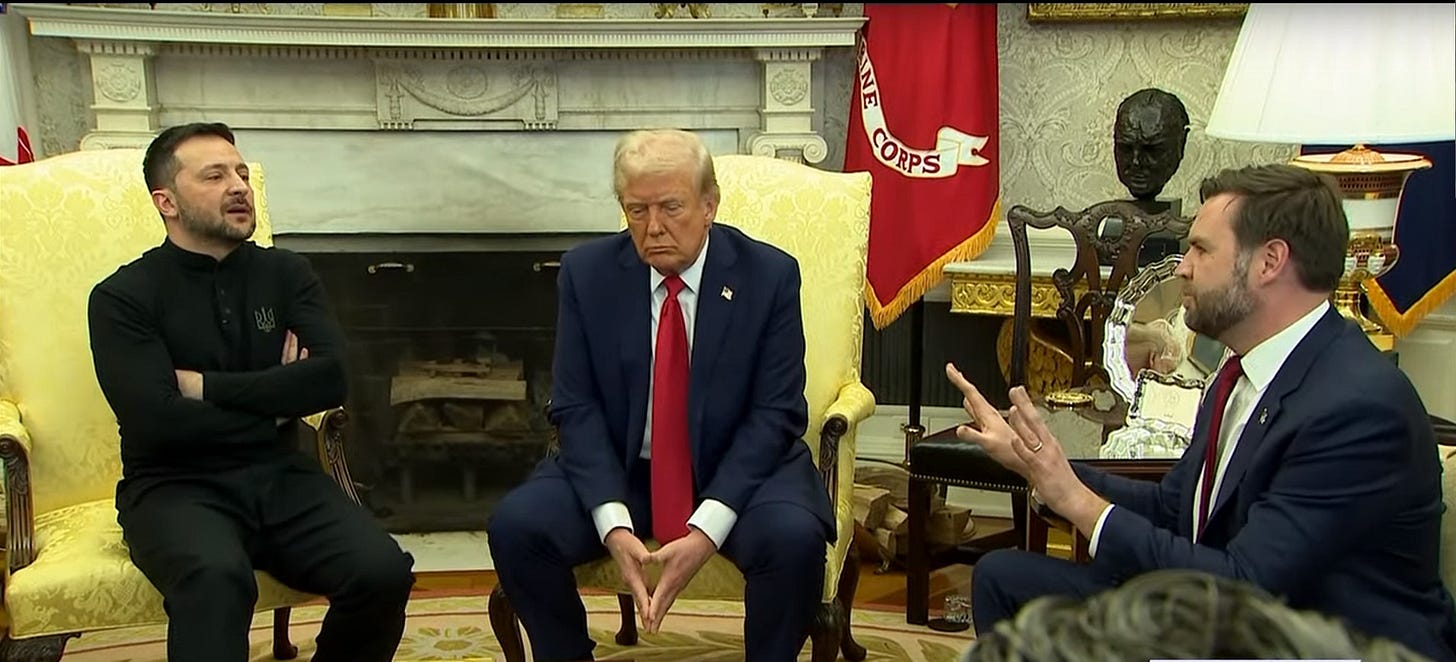How to Make Sensational Promises and Blame Someone Else for Not Keeping Them
Learn the Trumpian strategy of making sensational promises to stop a war and then blaming the victim of aggression in 3 easy steps.
To gain power, it's very important to make sensational promises that you know you’ll never be able to keep. For example, if there is a major war going and your voters seem to care about it at least somewhat, you could promise them that if you’re elected you will end the war in 24 hours, just as Donald Trump tremendously promised to end the war in Ukraine.
Such sensational promises will help you stand out from competition and grab everyone’s attention. And they can also help you build the myth of your exceptionality, which is a critical ingredient for building your personality cult and other nice things like that.
Should you be bothered by the fact that these promises will be impossible to keep? Absolutely not. All you’ll need is cleverly shift the blame to someone else. And this is the tricky part.
You could try blaming the invading country. Yet, since everyone expects the invading country to be the more problematic element, most people would simply look at such attempts to blame the aggressor as a cheap and unoriginal attempt to justify your inability to stop the war. Everyone would tell you that it was obvious that the aggressor would not give in, so when you made your promise to end the war in 24 hours you were a fool if you expected the aggressor to start acting reasonably.
It is much better, therefore, to blame the victim of the military aggression. It’s much more creative and unexpected, and thus more likely to convince your supporters that you could’ve stopped the war as easily as you had promised if only the victim of the aggression itself wanted to end to the war.
One the basic elements of enduring peace diplomacy has always been about making a victim take part of the blame. Of course, if you want to get away with making fantastic promises to end wars and then not keeping those promises, you want the victim to take most of the blame. For that, it is best to create a public spectacle in which you’ll portray the victim as the bad guy who is not only opposed to peace but who is also ungrateful to your country for all the good you’ve done for them.
A wonderful example of this strategy is Donald Trump’s masterful operation to shift the blame for the Russia’s aggression against Ukraine onto Ukraine itself and the Ukrainian president, all of which last week nicely culminated in the drama in the Oval Office between Trump and his sidekicks on the one side and the Ukrainian President Zelenskyy on the other.
1. Prime the Victim in Advance
You may want to start immediately with a meeting which you hope to turn into a public spectacle and make your victim look ingrate and guilty. Yet, that could be a mistake. It’s much better to prime your target beforehand so as to have them already somewhat unbalanced and agitated even before you meet them.
To start with, why not publicly say that the leader of the country that is being attacked is the one who really started the war?! Also, why not call him a dictator?!
This is, of course, exactly how Trump primed Zelenskyy weeks in advance before meeting him in the Oval Office, calling him a dictator and saying he started the war with Russia. (The only way Trump could have acted even more tremendously beforehand is by calling Russia the victim of Ukraine’s aggression and Vladimir Putin the great democratic leader.)
2. Make Them an Offer They Want to Refuse
The next step is to present the target with a deal they will want to refuse. You might, for example, ask them to sign a deal that requires them to give you their natural resources while you understandably promise them nothing of what they really want in return.
Donald Trump wisely presented Zelenskyy with a deal that would give the United States access to Ukraine’s rare earth minerals such lithium and titanium, but the United States would not provide any tangible security guarantees to protect Ukraine from further Russian aggression.
Naturally, according to the Trump White House, the mere presence of Americans in Ukraine involved in mining those minerals would be enough to deter Russia from attacking Ukraine. And at the same time Trump was saying that the United States would not directly militarily engage Russia. (It goes without saying that one of the most powerful deterrents against Russian aggression is other countries proclaiming that they will not militarily engage Russia. And it is also unimaginable that Russia would go about robbing Ukraine of its territory without directly attacking Americans present in Ukraine.)
When you try to force your target to accept a fine deal like that which makes them give up their natural resources in return for nothing they really need, it’s very likely they will reject it, and then you can much more easily paint them as being unreasonable and not wanting peace.
3. Let Your Weasel Agitate the Victim and Then Finish Them Off
When you’re in power or seeking power, it is very important to have a skilled weasel by your side. An accomplished political weasel will serve you well in twisting facts, offering tricky justifications and excuses, coming up with insidious arguments to throw off other political players, and so on.
Your professional weasel will come in particularly handy when you need to make someone look bad and disrespectful. To begin with, your weasel can push your target — the leader of the invaded country — to embrace your position by using broad, vague terms like “diplomacy.” When the target will ask what is meant by diplomacy or by responding that they had tried diplomacy before, that’s when your weasel can twist that into declaring that the target is disrespecting your country, your people, and your leadership.
A skilled political weasel won’t stop there and will use a range of tricks to agitate the target and exacerbate the contentious atmosphere. Your weasel can attack some of their policies and decisions, preferably all of that in hostile tone, and when the target pushes back, your weasel can further reframe this into their disrespect to your country and its high office.
An accomplished weasel will be able to turn anything into some evidence that the target is disrespecting your country, including their refusal to sign a deal that seems meaningless to them. In the hands of a skilled weasel, your target will always be greeted with a dilemma of either surrendering to your demands or coming off as disrespectful.
You should help your weasel, for example, by not giving the target an opportunity to fully respond and in other ways making him feel more frustrated, all of which will make him look even more unbalanced and disrespectful.
After the meeting, declare that even though you want peace and you’re ready to make it happen, the leader of the invaded country does not want peace. Here is how nicely Trump’s post used this approach with Zelenskyy:
“I have determined that President Zelenskyy is not ready for Peace if America is involved, because he feels our involvement gives him a big advantage in negotiations. I don’t want advantage, I want PEACE. He disrespected the United States of America in its cherished Oval Office. He can come back when he is ready for Peace.”
It’s really despicable that ingrates like Zelenskyy are resisting peace even though thanks to the tremendous efforts of the peace-loving Donald Trump peace is now easily available to Ukraine — all the Ukrainians have to do to have peace is accept ceasefire under unfavorable terms which would allow Russia in future to rinse and repeat robbing Ukraine of its territory only with better preparation.
In any case, once you’ve made your target look disrespectful, you can now easily blame the victim and say you won’t fulfill your promise to miraculously end the war in 24 hours — not because you can’t but because the leader of the victimized country disrespected your country. And now you have more free time, which you should use coming up with other fantastic, sensational promises which you won’t have to bother keeping either.




